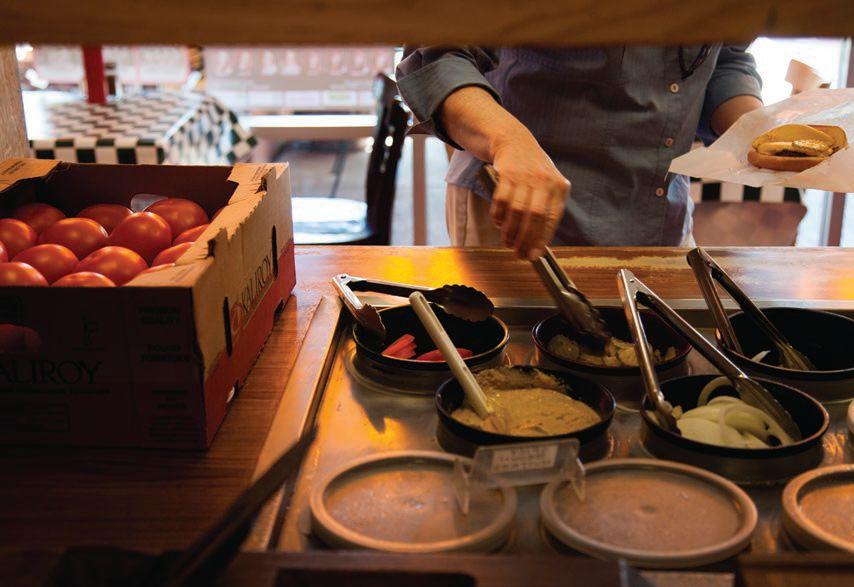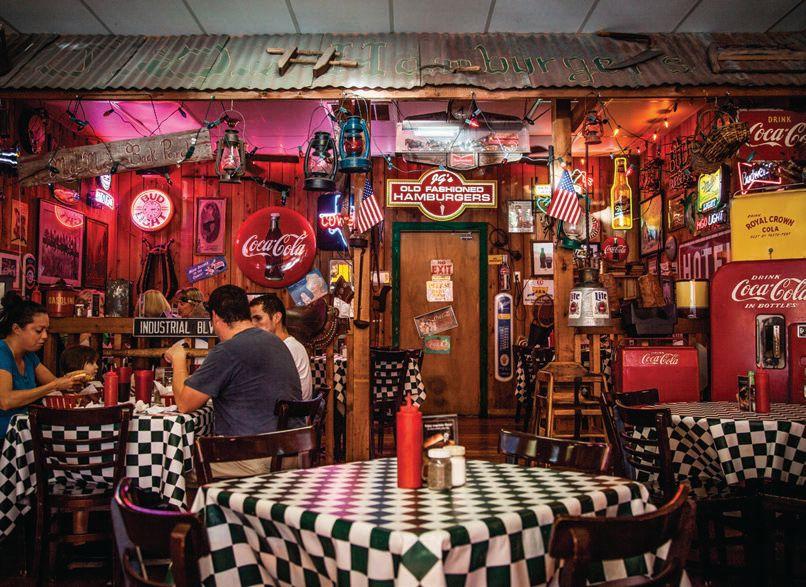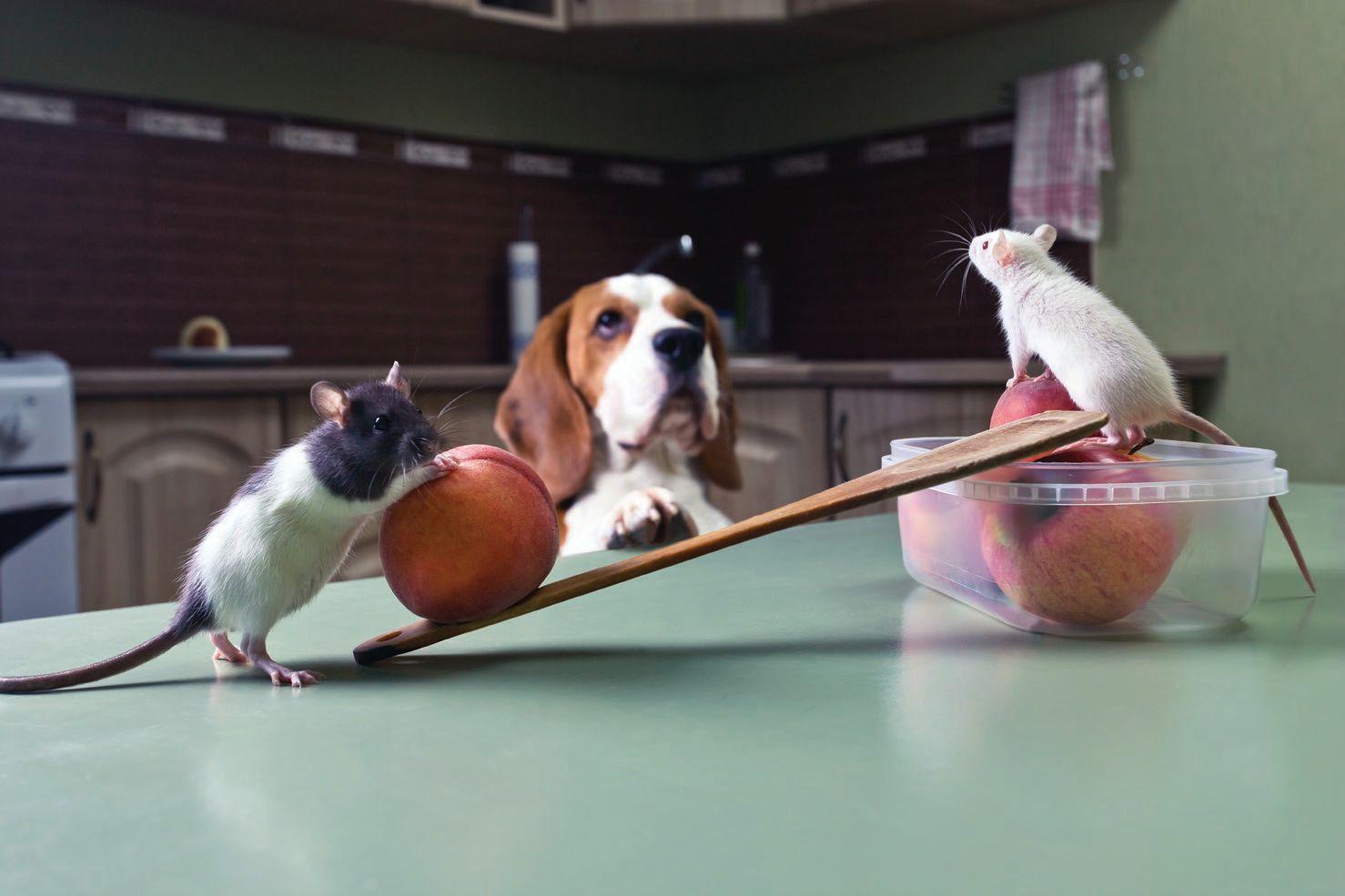
8 minute read
THAT PLACE is still there?


THE FORGOTTEN, OVERLOOKED AND TAKEN-FOR-GRANTED BUSINESSES THAT WE WOULD MISS TERRIBLY IF THEY DISAPPEARED







Story by Christina Hughes Babb // Photos by Kim Leeson
The latest development here,rumors of a new restaurant there,and closures every other week — such is the typical fodder for business-news talk. But what about those oft-forgotten institutions — the ones that do not beckon with novelty or glamour but, rather, persist quietly, like a patient grandparent waiting for us to visit? When we do, we are reminded why they endure: because they are genuine, loyal, sturdy and loved. They are a constant in a perpetually changing environment. Periodically, pay a visit to our neighborhood’s oldies. It will make you feel warm and a tad nostalgic. (Oh, and you should probably visit your grandparents, too.)
Backus Shell Station
The place with the car out front

GASSING UP IN THIS ERA, in our neighborhood, requires but a brief stop at any of a hundred stations, the swipe of a credit card and zero human interaction. Prior to the self-service trend that began in the 1970s which saved consumers some cents during an oil crisis — gas stations were staffed with attendants who pumped, checked tire pressure and oil, and washed the windows while they chatted up the patron or offered trinkets and key chains — a toy Exxon tiger tail, perhaps — to the kiddies.
Today only two full-service pumps remain in Dallas; one is here in Lake Highlands.
Located at Ferndale and Northwest Highway, Backus Shell was opened by Wayne Backus as a Mobil gas station in 1962.
If you can’t picture it, this should help: It’s the place with the antique red Chevy out front, under the “Win Me!” sign.
The day Wayne opened in March 1962, Lake Highlands High School was three years old. Behind the shop, Golden Home Builders was showcasing model houses in a new subdivision called Lake Highlands North ($18,000-$20,000 was the listed price range), and it snowed something awful.
“Opening day and he did not have one customer,” says Backus’ son, Darren, who runs the place today.
Darren started working there in 1969, when he was 10. His mom, Margie Backus, worked from day one until last year.
“She outworked me and my dad both,” Darren says. “She was here all the time. Did the books until she couldn’t handle it anymore.”
Wayne retired a few years ago, and he and Margie live in Rockwall.
About 10-20 customers utilize the fullservice pumps each day, Darren says. “It’s nothing like it used to be.”
Some drivers pull in, get confused or angry and speed away mad, Darren says. “Some say it’s a rip-off,” he says, momentarily looking forlorn. Inside his office behind the station, he sits amid stacks of paperwork, old photos and vintage Texaco station trinkets. His dog, Buffy, rests at his feet. Darren took six months off while undergoing chemotherapy following a cancer diagnosis years ago. Now he spends about 50 hours a week working here.
Full service is about a dollar more a gallon than self serve and includes a tire-pressure and oil check. Drive through for the tire, oil check and air, if you need it, sans gas, for $4. He says he tries to keep the price as low as possible and gives customers money-saving tips (fill up halfway, then take advantage of the other services, for example).
“Our clientele has died off over the years,” Darren says, “but we have customers who still want full service.” They might be elderly, disabled or simply do not want to mess with it.
“My mom has never pumped a drop of gas in her life,” Darren says, “and there are still people like that.”
Customer Jennifer Williams recalls the Backuses, way back when, making “house calls” to fix her mother’s car. Another says he uses Shell but sticks to self-serve; what he really misses is that chicken place that used to be across the street: “They had the best potatoes.”
But Shell’s true notoriety comes from the winnable red and white Chevy parked out front. Buy a winning lotto ticket here, and the car is yours. It’s been there for 23 years now.
“When we got into the lottery we were hesitant,” Darren says. “Gambling was not really our thing — we see people spend their check on it — but we decided if we were in, we’d be all the way in. My uncle had a ’55 Chevy that we would associate with the lottery. If they buy a winning ticket here, we throw in the car.” The car essentially was an advertisement for the lottery, and it worked.

“We were in the top ten Texas Lottery sellers for several years right after we got the car. One day we sold more lottery tickets than any [one-machine location] in Texas. We did $18,000 one day, and that was the record. There were satellite trucks, news crews outside the shop all of a sudden — we were on television, radio, newspapers.”
The car put the station on the map. “When we moved it to wash it or something, people would call and ask if it was gone,” Darren says.
Darren is a realist. Sure, he misses the old days, and he has pondered selling the place or building an “ecovenience” store (like nearby Green Spot) or doing something different with the business. But he says he understands that his occupation is a dying one, and change is hard. Cars are made better and need less. “GE is making cars that need no maintenance for the first two years,” he says. No one comes in to ask for directions or maps anymore. “Directions used to be a big thing for gas stations,” Darren says, “but the smartphone era has changed everything.”
“The question is: When do you give up?” he says. “I’m making a decent living, nothing like what my dad made, but the five guys working here have jobs and I can still pay the bills. We are able to keep doing what we do well. My dad always believed good customer service was important, and we deliver that. As long as I can do that, we’ll keep on.”
Dallas Diner and Donut
Customers: ‘Change is overrated’
“THERE’S A SAFETY IN THINKING in a diner,” film director David Lynch once said. “You can have your coffee or your milkshake, and you can go off into strange dark areas, and always come back to the safety of the diner.”
There are no strange dark areas inside Dallas Diner and Donut — it’s too tiny for that but there is ‘safety in thinking,’ not to mention sharing, amid the steady clanking of silverware and buzz of familiar voices. It is the sort of place you might drive past a hundred times without noticing. But when you finally walk in, it seems like home, like they’ve been waiting for you all along.
This postcard of a diner hasn’t changed much since the early ’80s, when it was a Dunkin’ Donuts owned by a franchisee named Mohamad Mokhtari, known to customers as Mr. Mo.

In the early 2000s, Mo changed it to Dallas Diner and Donut. Mr. Mo suffered a serious decline in health, retired and moved to California, and was not available for an interview, but the rumor around the diner is that franchising, with its guidelines and restrictions, pained him. Thus, he dumped Dunkin’ and rebranded.
The characters that spell out “Dallas” “Diner” and “Donuts” on an overhang out front are neat and sharp, but the backdrop is dingy and a hint of old lettering peeks through. Inside, colorful doughnuts stand at attention in rows behind a narrow counter lined with a dozen leather swivel stools. If you come in for lunch or afternoon coffee, you’ll likely be treated to a free doughnut, part of an effort to clear the shelves for tomorrow’s fresh crop before closing time — 3 p.m. Menus mounted up high on brick walls show fading photos of egg-andbacon or burger-and-fry plates. Vintage mugs and other tchotchkes hang from hooks above coffee makers and clusters of condiments.
The regulars talk a lot about how the bar used to be a horseshoe shape. The regulars do not like it when things change. The new owner, Andy Lim, tried to replace the coffee once, with a fancier brand; the regulars would not have it.
“They noticed right away,” Lim says. “I roast my own coffee. I started a small coffee company, which I sell through my dad’s [food supply] company, and it is really good coffee. I tried to sell it here, but they want the Community Coffee. I changed it back to Community Coffee. I try not to make any changes. Sometimes we have to get a different brand of sausage for maybe a day or two because of supply issues. They notice right away, and they get upset.”
No hard feelings, suggests Lim’s amused grin. “I think the regulars were pretty nervous about me altogether.”
When Mr. Mo fell ill and decided to sell the diner, Lim’s father, John Lim, who owns a food manufacturing and supply operation, bought the property. Andy, who is just 23, was bored by college and itching to get into business, he explains, so his father, who also owns other properties in Dallas suburbs, helped him get started.
Andy Lim says his father’s first business in Dallas was a doughnut shop. “He started it 35 years ago after emigrating here from South Korea,” Andy says. “He climbed the ranks and became one of the most successful in the Southwest with his rice and beansprout supply business.”
Lim started working at Dallas Diner last year as a manager, alongside Mr. Mo, before taking over ownership. He says he “didn’t want to scare off the employees” and wanted to ease his way into the position.
“Everyone loved Mr. Mo,” he says. When they found out he was sick, they came around to support him. It was very touching; these are kindhearted people,” Lim says.
The staff that was in place when Mo departed is still intact — Aida and Eliza up front and Terry in the kitchen. Jenny Lim, Andy’s sister, also works part time. Andy says he expected the staff to be wary of a young new owner; tread lightly, he understood. He did not, however, expect the regulars or the equal parts richness and challenges they add to his daily life.
“It is very interesting to meet these guys and their families,” he says. “It makes my life fun.”
At the east corner of the bar, Tom Garland, Johnny Chamness and Tony Flores gather, drink black coffee and tell war stories — literally and figuratively. Garland is an Army man, a World War II vet with four Bronze Stars. The latter two are Vietnam veterans, Navy and Air Force respectively. They have children who are police officers, lawyers and teachers; they have grandkids in high school and college. They retired from their professions in the ’70s or ’80s. One of them was an air conditioning repairman who used to come in at midnight and 5 a.m. when the place was a 24-hour joint.
“Guys would be arm wrestling in the corner over here — this bar used to be horseshoe-shaped, you know — but so hung-over and tired that neither of them had any fight left.”
The regulars, a consistent if dwindling cast, have been congregating here — thinking, remembering and sharing in safety — for decades.
“We have a lot of stories,” Flores says. “We had a friend — he was in World War II, in Normandy, and got shot and recovered and went back and stood with Patton. He used to sit there,” he continues, gesturing at an empty barstool, “but he died, and after that I decided to start taking pictures, so now we have the pictures of everybody. We come, sometimes a couple or three times a day. We talk history, politics. Argue. Remember. This is good human stuff here.”








